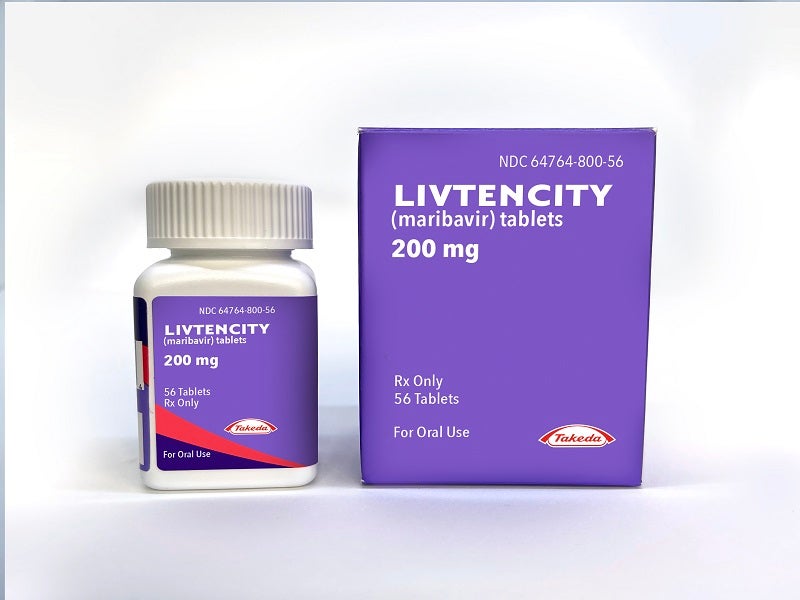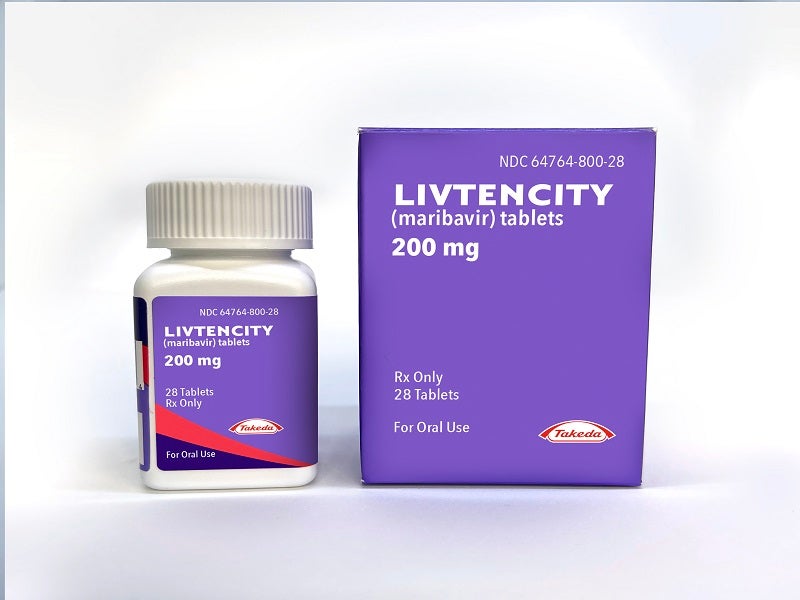Livtencity™ (maribavir) is a cytomegalovirus (CMV) pUL97 kinase inhibitor indicated for the treatment of post-transplant cytomegalovirus (CMV) infection and disease that is refractory to conventional antiviral treatments in patients aged 12 years and older.
Developed by Japanese pharmaceutical company Takeda Pharmaceuticals, Livtencity is available as a blue, oval-shaped convex tablet in 200mg dosage strength for oral administration.
Livtencity is Takeda’s second novel molecular entity approved by the US Food and Drug Administration (FDA) in 2021 after Exkivity™ (mobocertinib), the first oral therapy for the treatment of locally advanced or metastatic non-small cell lung cancer (NSCLC) with epidermal growth factor receptor (EGFR) exon 20 insertion mutations in adult patients.
Livtencity is available to physicians through speciality pharmacy providers including Biologics by McKesson and Amber Specialty Pharmacy.
Regulatory approvals for Livtencity
The FDA granted breakthrough therapy designation to maribavir for treating CMV infection in transplant patients in January 2018.
Takeda submitted a new drug application (NDA) for Livtencity to the FDA for the treatment of post-transplant CMV infection and disease in March 2021. The NDA was accepted for regulatory review in May 2021.
The FDA Antimicrobial Drugs Advisory Committee (AMDAC) unanimously recommended the use of maribavir (TAK-620) for treating refractory CMV infection and disease in October 2021. The FDA approved the drug for the indication in November 2021.
The drug also holds orphan drug designation from the European Commission (EC) for the treatment of CMV disease in patients with impaired cell-mediated immunity. Livtencity also received orphan drug designation from the FDA for clinically significant CMV viremia and disease in at-risk patients.
Cytomegalovirus (CMV) infection causes and symptoms
CMV is a common type of beta herpes virus that remains in the body for life once infected. The virus is usually dormant and asymptomatic in the human body, but can reactivate under immunosuppression.
CMV infection in transplant patients increases the risk of co-infections such as pneumonia and gastrointestinal disease and can have severe consequences, including loss of the transplanted organ, and can lead to death in extreme situations. CMV spreads via bodily fluids such as blood, saliva, urine, sperm, and breast milk.
CMV is one of the most prevalent viral infections experienced by transplant patients, with an estimated incidence rate of 16% to 56% in solid organ transplant (SOT) recipients and 30% to 70% in hematopoietic stem cell transplant (HSCT) recipients of the estimated 200,000 adult transplants a year performed globally.
Common symptoms of CMV include fatigue, fever, sore throat, and muscle aches.
Livtencity’s mechanism of action
Livtencity (TAK-620) is an orally bioavailable anti-CMV compound that works by inhibiting the activity of human cytomegalovirus enzyme pUL97 kinase and its natural substances, thus blocking virus replication, including viral DNA synthesis, viral gene expression, encapsidation, and egress of mature capsids from the nucleus.
Clinical trials on Livtencity
The FDA’s approval for Livtencity for treating refractory CMV infections with or without genotypic resistance to ganciclovir, valganciclovir, cidofovir and foscarnet was based on its safety and efficacy results from SOLSTICE, a Phase III, multi-centre, randomised, open-label, and active-controlled superiority clinical trial.
In the trial, 352 HSCT and SOT patients with refractory CMV infection were enrolled and randomised in a 2:1 ratio to receive either 400mg Livtencity twice daily or investigator-assigned treatment (IAT) for up to eight weeks, followed by a 12-week follow-up phase.
The primary measure outcome of the trial was confirmed CMV viremia clearance at week eight, validating confirmed plasma CMV DNA concentration levels below 137IU/ml.
The Livtencity study revealed CMV viremia clearance in 56% of patients with refractory or resistant (r/r) CMV infection/disease when compared to those treated with IAT (24%).
The most common adverse events reported in the patients treated with Livtencity during the trial were taste disturbance, nausea, diarrhoea, vomiting, and fatigue.





